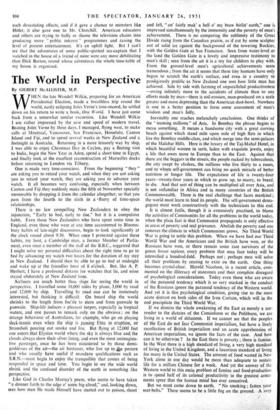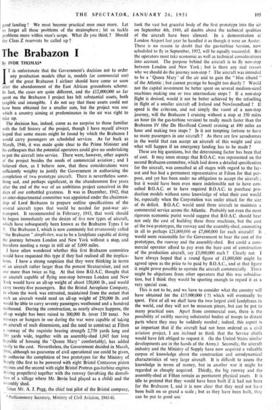The World in Perspective
By GILBERT McALLISTER, M.P.
WHEN the late Wendell Wilkie, preparing for an American Presidential Election, made a breathless trip round the world, easily eclipsing Jules Verne's time-record, he settled down on his return to write a book, One World. I have just come back from a somewhat similar excursion. Like Wendell Wilkie I am rather impressed by the ease and speed of modern travel. Beating Jules Verne by three days, I managed, flying west, to make calls at Montreal, Vancouver, San Francisco, Honolulu, Canton Island and Fiji, and to spend several weeks in New Zealand and a fortnight in Australia. Returning in a more leisurely way by ship, I was able to enjoy Christmas Day in Ceylon, pay a fleeting visit to India, begin the New Year in Aden, spend a short time in Egypt, and finally look at the excellent reconstruction of Marseilles docks before returning to London via Tilbury.
One is made very time-conscious. From the beginning " they " are asking you to retard your watch, and when they are not asking you to retard your watch, they are asking you to advance your watch. It all becomes very confusing, especially when between Canton and Fiji they suddenly make the fifth of November specially memorable by dropping it from the calendar altogether, so that you pass from the fourth to the sixth in a -flurry of time-space relationships.
There is no law compelling New Zealanders to obey the injunction, " Early to bed, early to rise." but it is a compulsive habit. Even those New Zealanders who have spent some time in England, even those who were at one time accustomed to Blooms- bury habits of late-night discussions, begin to look significantly at the clock round about 9.30. When once I protested against these habits, my host, a Cambridge man, a former Member of Parlia- ment, even once a member of the staff of the B.B.C., suggested that I might solve my personal difficulties about the right time to go to bed by advancing my watch two hours for the duration of my stay in New Zealand. I should then be able to go to bed at midnight and wake up at the friendlier hour of 8 o'clock. But, like A. P. Herbert, I have a profound distaste for watches that lie, and mine stayed obdurately at New Zealand time.
Airliners are much better than ships for seeing the world in perspective. I travelled some 18,000 miles by plane, 3,000 by road and 12,000 by ship. Travelling by road one can be immensely interested, but thinking is difficult. On board ship the world shrinks to the length from foc'sle to stern and from gunwale to gunwale. Ship-life induces a pleasant torpor, especially in tropical waters, and one pauses to remark only on the obvious ; on the strange behaviour of Australians, for example, who go on playing deck-tennis even whcn the ship is passing Etna in eruption, or Stromboli pouring out smoke and fire. But flying at 12,000 feet one enters that Elysian world where the sky is always blue and, the clouds always show their silver lining, and even the most unimagina- tive passenger, once he has been ministered to by those demi- goddesses of the air—the air hostesses, who live up to4be posters and who usually have useful if mundane qualifications such as S.R.N.—must begin to enjoy the tranquillity that comes of being suspended in space and time. You begin to sec the wide world shrink and the confused disorder of the earth in something like perspective.
Like God in Charles Murray's poem, who seems to have taken "a donner furth to the edge o' some big cloud," and, looking down, tees how Men He made Himself have started out to poison, shoot
and fell, " an' fairly mak' a hell o' my braw birlin' earth," one is impressed simultaneously by the immensity and the poverty of man's achievement. There is no comparing the sublimity of the Great Divide rising from the Canadian prairie, as if cut by some sculptor out of solid ice against the background of the towering Rockies, with the Golden Gate at San Francisco. Seen from water-level or the land the Golden Gate is a lovely and impressive testimony to man's skill ; seen from the air it is a toy for children to play with. From the ground-level men's agricultural achievements seem tremendous ; from the air it seems that these tiny humans have only begun to scratch the earth's surface, and even in a country so prodigiously prolific as New Zealand one sees how little man has achieved. Side by side with farming of unparalleled productiveness —owing infinitely more to the accidents of climate than to any efforts made by man—there is soil-erosion, man-produced on a scale greater and more depressing than the American dust-bowl. Nowhere is one in a better position to form some assessment of man's wisdom and man's folly.
Inevitably one reaches melancholy conclusions. One thinks of the " teeming millions" of Asia. In Bombay the phrase begins to mean something. It means a handsome city with a great curving beach against which stand mile upon mile of high flats in which live the Bombay middle-class, and which merge into the semi-palaces of the Malabar Hills. Here is the luxury of the Taj-Mahal Hotel, in which beautiful women in saris, laden with exquisite jewels, enjoy a life that owes more to Europe than to the East. Against that there are the beggars in the streets, the people racked by tuberculosis, the city swept by cholera, the millions who live thirty to a room, and to whom self-government can bring no quick miracle of better nutrition or longer life. The expectation of life is twenty-four years—twenty-four years in which to grow up, to marry, to breed. to die. And that sort of thing can be multiplied all over Asia, and is not unfamiliar in Africa and in many countries of the British Commonwealth. There is the real challenge that faces mankind : the world must learn to feed its people. The self-government dema- gogues must work constructively with the technicians to this end.
It is almost futile, though it is extensively practised, to blame the activities of Communists for all the problems in the world today, when the plain fact is that Communist propaganda is only effective in areas of poverty and real grievance. Abolish the poverty and one removes the climate in which Communism grows. No Third World War is going to settle this problem. When we have had our Third World War and the Americans and the British have won, or the Russians have won, or there remain some rare survivors of the genus homo sapiens, every problem that men face today will be intensified a hundred-fold. Perhaps not ; perhaps men will solve all their problems by ceasing to exist on the earth. One thing becomes crystal-clear. Harold Nicolson, in a recent article, com- mented on the illiteracy of statesmen and their complete disregard of psychological considerations. Today even those who are aware of the paranoid tendency which is so very marked in the conduct of the Russians ignore the paranoid tendency of the Western world. And yet it is this psychological condition, giving rise to the most acute distrust on both sides of the Iron Curtain, which will in the end precipitate the Third World War.
If we dismiss the whole awakening of the East as merely a sur- render to the dictates of the Cominform or the Politburo, we are living in a world of delusions. If we cannot see that the peoples of the East do not fear Communist imperialism, but have a lively recollection of British imperialism and an acute apprehension of American imperialism, we ignore the facts of the case. And how can it be otherwise ? In the East there is poverty ;. there is famine. In the West there is a high standard of living, a very high standard of living in the United Kingdom, and a luxurious standard of living for many in the United States. The amount of food wasted in Nev. York alone in one day would be more than adequate to sustain life for a million Chinese for a week. And yet the answer of the Western world to this main problem of famine and food-production is to spend half of its colossal productivity in the greatest arma- ments spree that the human mind has ever conceived.
But we must come down to earth. " No smoking ; fasten your seat-belts." There seems to be a little fog on the ground. A very
good landing ! We must become practical men once more. Let us forget all these problems of the stratosphere ; let us tackle
problems more within man's scope. What do you think Should the Class Z reservists be called up ?







































 Previous page
Previous page